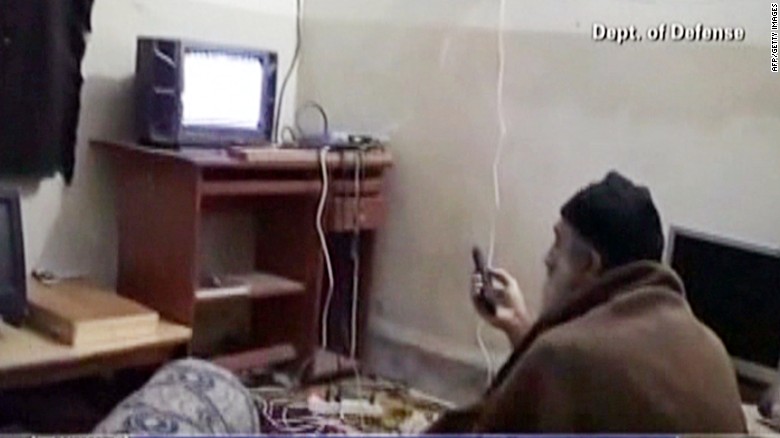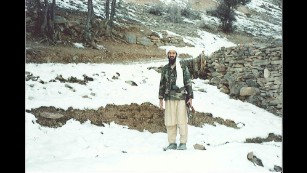In his final years hiding in a compound in Pakistan, Osama bin Laden was a man who at once showed great love and interest in his own family while he coldly drew up quixotic plans for mass casualty attacks on Americans, according to documents seized by Navy SEALs the night he was killed.
On Wednesday morning, the U.S. Office of the Director of National Intelligencereleased an unprecedented number of documents from what U.S. officials have described as the treasure-trove picked up by the SEALs at bin Laden's compound in Abbottabad, Pakistan, on May 2, 2011.
Totaling 103 documents, they include the largest repository of correspondence ever released between members of bin Laden's immediate family and significant communications between bin Laden and other leaders of al Qaeda as well as al Qaeda's communications with terrorist groups around the Muslim world.
Also released was a list of bin Laden's massive digital collection of English-language books, think tank reports and U.S. government documents, numbering 266 in total.
To the end bin Laden remained obsessed with attacking Americans. In an undated letter he told jihadist militants in North Africa that they should stop "insisting on the formation of an Islamic state" and instead attack U.S. embassies in Sierra Leone and Togo and American oil companies. Bin Laden offered similar advice to the al Qaeda affiliate in Yemen, telling it to avoid targeting Yemeni police and military targets and instead prioritize attacks on American targets.
Much of bin Laden's advice either didn't make it to these groups or was simply ignored because al Qaeda affiliates in Yemen and North Africa continued to attack local targets.
ISIS, of course, didn't exist at the time bin Laden was writing. The group, which now controls a large swath of territory in the Middle East, grew out of al Qaeda in Iraq and has charted a different path, seeking to create an Islamic state and not prioritizing attacks on the United States and its citizens.
Taken together, these documents and reading materials paint a complex, nuanced portrait of the world's most wanted man in the years before he was killed in the raid on his compound.
In the letters that bin Laden exchanged with his many sons and daughters, he emerges as a much-loved and admired father who doted on his children. And in a letter he sent to one of his wives, he even comes off as a lovelorn swain.
That's in sharp contrast to the letters bin Laden sent to al Qaeda leaders that demanded mass casualty attacks against American targets and insisted that al Qaeda affiliates in the Middle East stop wasting their time on attacks against local government targets. "The focus should be on killing and fighting the American people," bin Laden emphasized.
What bin Laden was reading
Bin Laden's digital library is that of an avid reader whose tastes ran from "Obama's Wars," Bob Woodward's account of how the Obama administration surged U.S. troops in Afghanistan in 2009 and 2010, to Noam Chomsky as well as someone who had a pronounced interest in how Western think tanks and academic institutions were analyzing al Qaeda.
Bin Laden was a meticulous editor, and some of the memos he wrote were revised as many as 50 times. Of the thousands of versions of documents recovered from computers and digital media that the SEALs retrieved at bin Laden's compound, the final tally numbers several hundred documents.
The new documents show how bin Laden reacted to the events of the Arab Spring, which was roiling the Middle East in the months before his death. While bin Laden had nothing to say publicly about the momentous events in the Middle East, privately he wrote lengthy memos analyzing what was happening, pointing to the "new factor" of "the information technology revolution" that had helped spur the revolutions and characterizing them as "the most important events" in the Muslim world "in centuries."
Osama bin Laden's Afghan hideout 31 photos
Some of the documents paint an organization that understood it was under significant pressure from U.S. counterterrorism operations. One undated document explained that CIA drone attacks "led to the killing of many jihadi cadres, leaders and others," and noted, "(T)his is something that is concerning us and exhausting us." Several documents mention the need to be careful with operational security and to encrypt communications and also the necessity of making trips around the Afghan-Pakistan border regions only on "cloudy days" when American drones were less effective.
Al Qaeda members knew they were short on cash, with one writing to bin Laden, "Also, there is the financial problem."
Some of the documents have nothing to do with terrorism. One lengthy memo from bin Laden worried about the baleful effects of climate change on the Muslim world and advocated not depleting precious groundwater stocks. Sounding more like a World Bank official than the leader of a major terrorist organization, bin Laden fretted about "food security." He also gave elaborate instructions to an aide about the most efficacious manner to store wheat.
Family concerns
Many of the documents concern bin Laden's sprawling family, which included his four wives and 20 children. Bin Laden took a minute interest in the marriage plans of his son Khalid to the daughter of a "martyred" al Qaeda commander, and he exchanged a number of letters with the mother of the bride-to-be. Bin Laden excitedly described the impending nuptials, "which our hearts have been looking forward to."
Bin Laden corresponded at length with his son Hamza and also with Hamza's mother, Khairiah, who had spent around a decade in Iran under a form of house arrest following the Taliban's fall in neighboring Afghanistan during the winter of 2001.
Hamza wrote a heartfelt letter to bin Laden in 2009 in which he recalled how he hadn't seen his father since he was 13, eight years earlier: "My heart is sad from the long separation, yearning to meet with you. ... My eyes still remember the last time I saw you when you were under the olive tree and you gave each one of us Muslim prayer beads."
In 2010 the Iranians started releasing members of the bin Laden family who had been living in Iran. Bin Laden spent many hours writing letters to them and to his associates in al Qaeda about how best he could reunite with them.



0 التعليقات:
إرسال تعليق